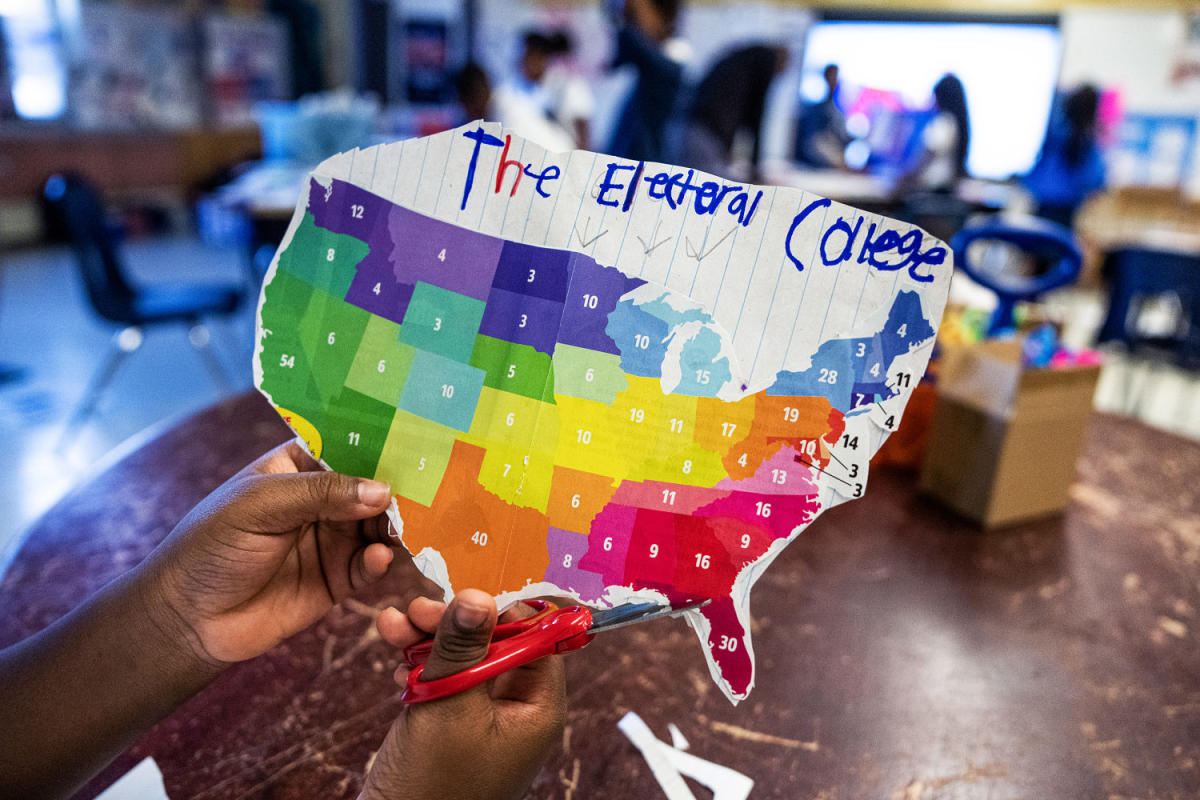
The assumption was that the Electoral College math would continue to favor the GOP and disadvantage Democrats. But the main theme as we barrel toward the 2024 presidential election seems to be “expect the unexpected.” Vice President Kamala Harris and former President Donald Trump remain frustratingly close in poll after poll, opening the door to a world where he wins the popular vote but still loses the Electoral College and the presidency.
If that were to happen, it would upend years of assumptions about the shape of American democracy. It has been Democrats who have been clamoring the loudest for the vestigial organ that is the Electoral College to finally be excised from the Constitution. But even if Harris only wins thanks to an arcane formula devised over 200 years ago, there’s still no valid reason for keeping such an undemocratic institution around.
Harris and Trump are statistically deadlocked in many vital swing states, with neither holding a clear edge outside of the margin of error in most polls. But the eight states that are seen as crucial in the final days of the race aren’t important because they’re the most populous. Rather, the reason places like Georgia and Pennsylvania hold such outsize significance is that they’re competitive enough to tilt the Electoral College to one candidate or the other.
We’ve already recently seen Democrats outperform in the national popular vote versus the final Electoral College tally — twice. When Trump won in 2016, it was with a narrow Electoral College win but lacking a popular mandate; his loss in 2020 was likewise a national blowout but intensely close in the swing states that tipped President Joe Biden over the edge. To wit: Trump won Wisconsin by just under 23,000 votes in 2016 and lost it by around 21,000 votes in 2020.
There’s every indication that this year will be just as close — but what if it didn’t all come down to just a handful of voters in fewer than 20% of the states in the union? I’ve long argued that the Electoral College has been warped far beyond the original intent of the Constitution’s drafters. As I wrote after the 2020 election, the version of the Electoral College that Alexander Hamilton envisioned, one where “‘there will be a constant probability of seeing the station filled by characters pre-eminent for ability and virtue,’ has basically never operated as designed.”
Instead, the rise of political parties gave way to the current system. Voters on Election Day are really selecting either Democratic or Republican electors who’ve promised to cast their vote for their respective party’s nominee. It’s a convoluted practice that adds an unnecessary layer between the people and the presidency. Moreover, as Rep. Jamie Raskin, D-Md., said in a 2022 interview, “there are so many curving byways and nooks and crannies in the Electoral College that there are opportunities for a lot of strategic mischief.”
Trump tried to exploit those oddities in his failed attempt to remain in office after his 2020 loss. But there has been no real surge of energy to abolish the Electoral College as a result. In fact, the closest the country has come to doing so was in 1970, after Richard Nixon ran away with the electoral vote but won the popular vote by less than 1% of the national total. The resulting constitutional amendment passed the House but was filibustered in the Senate, an instance where an antidemocratic institution was preserved only thanks to an antidemocratic process.
With the electoral system still firmly in place for next week’s election, it would take a very specific set of circumstances to see Harris prevail while losing the popular vote to Trump. As The New York Times’ Nate Cohn explained last month, Trump’s advantage in the Electoral College has been fading as the gap between Harris’ lead in national polls and the so-called “tipping point” state have narrowed. This is possible because Harris is faring well in the northern battlegrounds of Michigan, Pennsylvania and Wisconsin while Trump has been eating at the margins in noncompetitive states like New York.
The fact that we even need to do this kind of math to try to determine who might win the presidency is absurd. The current mechanics disenfranchise urban conservatives and rural liberals alike, substituting geography for political agency. A world where the direct popular vote was determinant would force candidates to compete for every vote in every state. It would be another much-needed step in America’s centurieslong transformation from an amalgamation of independent states into a single national unit.
The question then would become whether Harris would be running a different campaign than she is now without the hyperfocus on swing states. And given her shift to the center and intense focus on peeling off moderate Republicans, I can’t say that she would. Nor would Trump be much predisposed to break for the middle in that situation — not that he’d have won in 2016 without the Electoral College’s assistance.
And the idea that Trump could win the popular vote while losing the Electoral College should not serve as a deterrent to its abolition. If that is truly the will of the American people, let it be on their heads directly that he be returned to the White House. Let it have been a true race for the hearts and minds of the full electorate that ends the American experiment with democracy, not an adherence to the scribblings of aristocrats scared of their countrymen’s power.
This article was originally published on MSNBC.com
EMEA Tribune is not involved in this news article, it is taken from our partners and or from the News Agencies. Copyright and Credit go to the News Agencies, email news@emeatribune.com Follow our WhatsApp verified Channel




